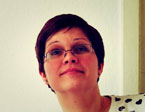 What was your route into dental nursing Sylvia?
What was your route into dental nursing Sylvia?
After completing my Master’s degree in Chemistry in Poland, I took a gap year while I decided what I wanted to do.
I moved to London and had no idea what I would end up doing.
One day my friend said to me, “You always wanted to be a dentist - why don’t you look at dental nursing?”
The Eastman Dental Hospital was recruiting dental nurses, so I went for an interview. They were worried that I was a bit overqualified, but I told them how interested I was in the subject and that I really wanted a place on the training course. As a result, I was accepted.
Did having a science degree help you?
In some ways, yes - it meant I picked up certain things quite quickly and understood the reasons behind others. But I still had to learn things like how to work with patients, and gain other skills that I had no previous training in.
When I finished my training I was offered a job at Eastman. I knew straight away that I wanted to work with young people in paediatrics. A year after my training I started a job in the children’s department at Eastman, and I’m still here!
How has your career developed since then?
I spent three years thinking, “I’m pretty senior - I still love my job, but I want to do more”. We have lots of student nurses here, and I always found myself helping them, telling them what we do and helping with their placements. So I thought, “Maybe I can go beyond the hospital and do this outside?” So I earned my Diploma in Adult Education and I began teaching.
But I didn’t just want to work in the hospital - I wanted to go out to the wider world to see how people work elsewhere and to meet new people. Then, six months ago I stumbled across The Dental Nurse Network, and I decided I wanted to be involved.
What further qualifications have you gained since qualifying?
The most important one for me was a six-month course on inhalation sedation, because we used that every day in practice – without it our department wouldn’t exist. The same course taught me about intravenous sedation, which involves canulation.
It’s useful, because I can look at the notes and understand what the patient is going to need. With children and teenagers things often take more time, so it helps the dentist if I can get things moving early.
I talk them through it and prepare the canulation, and by the time the dentist arrives everything is ready to go. She can just introduce herself, check everything is right, and get going.
What do you love about your job?
I love working with children – I’ve always felt connected to them. I love working with them in a paediatric environment, and the interactions that I get to have.
I also love the variety of my job, which is why I like a hospital environment. We can do everything from simple check-ups to surgical procedures, sedation and anesthesia. It’s such a wide spectrum that it’s impossible to be bored!
What frustrates you about your job?
Sometimes as a dental nurse you will work with people who don’t care about the job that much, and who are perhaps just there for the money. That may be fair enough in some jobs, but I believe if you are a teacher, a doctor, or a nurse (for example) it’s not only about the money - you should really love what you do.
But this is my only minor frustration; apart from that I have no negativity towards the profession.
How do you see the role of the nurse changing?
Even since I began in 2006 I’ve seen it change a lot. Nowadays nurses are involved so much more from planning to treatment, and are trusted to do much more. Courses are better and involve things like titration, which I think is excellent. Hopefully this trend will continue!
What advice would you give to a young nurse starting out on his or her career?
Well, firstly I think it’s good that you say “his”. In the last few years I’ve seen a lot more men applying for nursing positions, and I think this is still often viewed negatively. Perhaps people haven’t adjusted and are still unused to it, but surely it can only be a good thing.
So, to a young nurse I would say to look at one of the many, many nurses who have done similar things to me. We all started out as a dental nurse, yet we get to go on to do so many things. You can work in a practice, in a hospital, as a practice manager, as a teacher. It’s an open path and it’s your life, so choose what you want and enjoy it.

